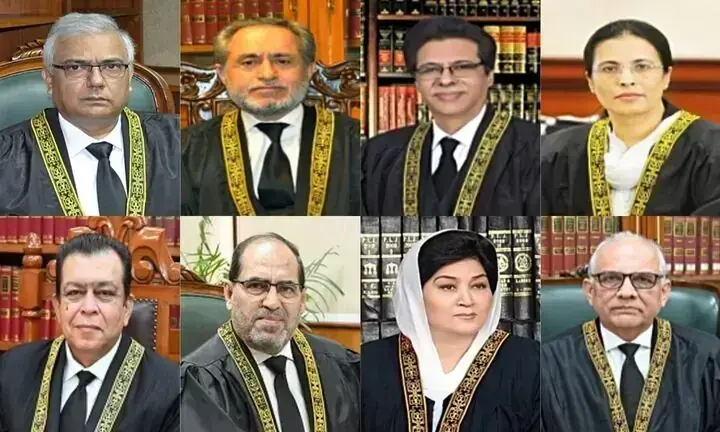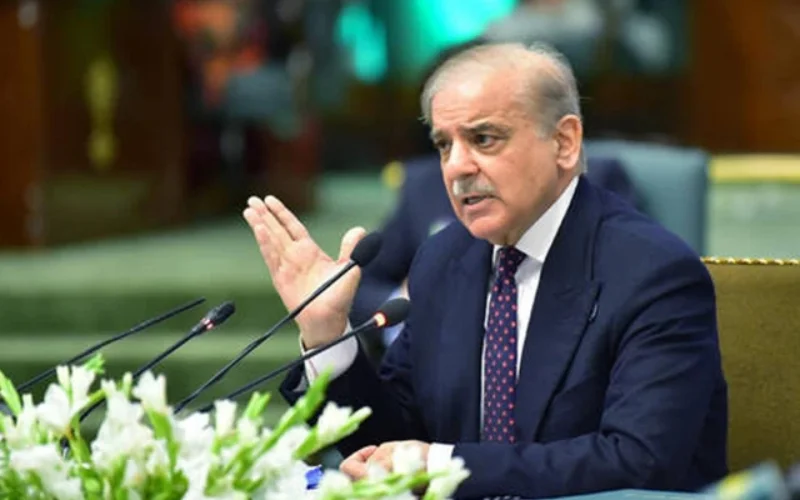Senior lawyer Munir A. Malik contended on Thursday that an order for the formation of a full court could be issued using “judicial powers” as an eight-member Constitutional Bench (CB) of the Supreme Court (SC) heard pleas against the contentious legislation.
The Amendment was passed by the parliament during an overnight session in October last year, with the PTI claiming seven of its lawmakers were abducted to gain their favour as the party opposed the legislation. The Balochistan National Party-Mengal (BNP-M) also alleged its two senators were being pressured, with both later defying party line to vote in the tweaks’ favour.
The legislation, which altered judicial authority and tenure, has been a lightning rod for debate with both opposition parties and legal experts questioning its impact on the judiciary’s independence.
The tweaks took away the SC’s suo motu powers, set the chief justice of Pakistan’s (CJP) term at three years and empowered a Special Parliamentary Committee for the appointment of the CJP from among the three most senior SC judges. It also paved the way for the formation of the CB, which is now hearing petitions against the very legislation that enabled its establishment.
The CB hearing the pleas is headed by Justice Aminuddin Khan and also includes Justices Jamal Khan Mandokhail, Muhammad Ali Mazhar, Ayesha Malik, Syed Hasan Azhar Rizvi, Musarrat Hilali, Naeem Akhtar Afghan and Shahid Bilal Hassan.
Today’s hearing — which was streamed live — began at 11:30am and was adjourned at around 1pm. Malik, the counsel for the Balochistan High Court Bar Association (BHCBA), presented his arguments. Former Supreme Court Bar Association (SCBA) president Abid Shahid Zuberi also began his arguments and is set to continue them on October 13 (Monday).
During the hearing, judges questioned whether the CB had the power to issue orders for the constitution of a full court, while Malik contended that it could do so through a judicial order.
During yesterday’s hearing, Lahore High Court Bar Association (LHCBA) lawyer Hamid Khan had requested the formation of a 16-member bench to hear the pleas, as per the number of SC judges at the time of the 26th Amendment’s passage.
Several judges, including Justice Aminuddin, observed that the 26th Amendment was currently part of the Constitution. Some judges questioned whether the CB had the power to form a full court, while Justice Ayesha noted there was no restriction on issuing a judicial order for that.
The bench will first determine whether the challenges should be heard by a full court comprising all available SC judges or by the same eight-judge CB, before deciding on the legality of the 26th Amendment.
The case was initially taken up in January, and after the CB’s approval of petitioners’ request for it, the proceedings are being live-streamed on the SC’s YouTube channel.
The hearing
At the outset of the hearing, Malik voiced his support for the arguments presented by LHCBA counsel Hamid yesterday. At this, Justice Mandokhail asked him whether he also backed the statements about “keeping the points of the 26th Amendment aside”.
Justice Mazhar also noted that Hamid had asked the court to ignore the Article 191A introduced in the 26th Amendment, under which the constitutional benches were formed in the apex court.
Malik then replied that a full court “existed before the 26th Amendment”. He contended that the CB was “formed within the Supreme Court” and requested that a bench comprising all SC judges hear the pleas.
“Yes, absolutely. This order can be issued using judicial powers,” the BHCBA lawyer said in response Justice Mandokhail asking if the CB had the authority to form a full court. “Everyone is obliged to follow a judicial order under Article 191A,” the counsel added.
At this point, Justice Ayesha asked whether there was any “obstacle” in constituting a full court bench. Justice Mazhar also wondered about the CB’s powers.
The BHCBA lawyer responded that “it did not matter whether the current bench was a regular one or Constitutional, the current bench could decide on who will hear the case”.
Justice Ayesha then asked Malik if he wanted the CB to issue orders for a full court using its judicial powers. “You are depending on the same amendment that you are challenging. This court has said numerous times before not to depend on the challenged amendment but on the original Constitution,” she remarked.
The counsel contended that judicial powers and judicial jurisdiction were two different things. “The Supreme Court is the full court. The Constitutional Bench is a crafted department of the Supreme Court.”
Justice Mandokhail then observed that, as per Article 191A, the Judicial Commission of Pakistan (JCP) nominated the judges for the CB and it had the authority to nominate all apex court judges for the CB. Giving an example, he asked whether the CJP could say “no, this case will be heard by a full court” if the JCP decided a five-member CB.
Malik replied by saying that any kind of bench could issue a judicial order and there were no obstacles for it.
Here, Justice Ayesha wondered if a full court could be constituted in the presence of the 26th Amendment. “If we have to consider the judicial powers, then do we not have to look at Article 191A?” she asked.
The BHCBA counsel stated that he considered the CB a bench of the apex court.
At one point, Justice Hilali and Mandokhail had a brief exchange over who should be part of the bench hearing the petitions taken up.
Justice Hilali questioned how the current bench could decide its own jurisdiction. “We will need to return to before the amendment in the Constitution and review why the 26th Amendment was done. In my opinion, those judges who were appointed after the 26th Amendment should not be part of the bench,” she added.
At this, Justice Mandokhail quipped: “We are from before the 26th Amendment [but] were the new judges appointed after being brought from some other country?”
Justice Mazhar also observed that the amendment was “not related to the new judges, the number of judges has not changed”. Justice Mandokhail highlighted that four judges elevated to the SC in February had remained high court chief justices.
Justice Hilali then clarified, “I did not say so with sinister thinking. An impression is being given as if I said so with malicious thinking.”
Justice Mandokhail remarked, “Judges are honourable; they should not be thrown under the bus.
“In every meeting of the Judicial Commission, the chief justice and I demanded that all judges be included in the Constitutional Bench. Will you be satisfied in such a situation?” he asked Malik, who reiterated that both regular bench and the CB had judicial powers.
Justice Mandokhail then told Malik to keep aside the matter of the bench’s jurisdiction and suggest a “way through which all judges can sit on the bench”.
He also raised the question of whether the CJP would head that bench or the head of the CB.
Justice Aminuddin, who chairs the CB, then asked: “Should we then remove the judges [appointed] after the 26th Amendment from the bench?”
Justice Mandokhail wondered, “Has it ever happened that a judge came to the Supreme Court and then went back?”
Justice Aminuddin added another question: “What will happen to the judges included in the current constitutional bench?
“We have also faced a lot of verbal abuses,” he lamented.
Addressing the BHCBA counsel, Justice Mandokhail remarked, “It seems you do not trust the current constitutional bench judges. Whether willingly or not, Supreme Court judges have accepted the 26th Amendment.”
At this point, Malik concluded his arguments and ex-SCBA president Zuberi came to the rostrum.
In his arguments, Zuberi asserted that it was “not necessary” for all SC judges to be a part of a full court. “Available judges can also complete the quorum in a full court.”
Justice Hilali asked him whom the CB could order to form a full court, to which Zuberi replied that the bench would issue the directives to the Practice and Procedure Committee, which has the authority to form benches for cases.
Upon being asked about whether he wanted the full court based on the judges present prior to the 26th Amendment or after it, Zuberi voiced his request for the former. “There was a full court present before the Amendment,” he contended.
Subsequently, the CB adjourned the hearing till October 13 (Monday), when the former SCBA head is expected to continue his arguments.
The petitions
The 26th Amendment had been challenged by various bar associations, bar councils, lawyers, the PTI, and some politicians. The SC is also seized with separate petitions seeking the formation of a full court to hear the matter, rather than the CB.
The petitioners have requested the apex court to strike down the entire 26th Amendment on grounds of procedural impropriety if determined that the requisite two-thirds of the lawfully elected membership of each House did not freely exercise their right to vote in favour of the same as required under Article 239, which elaborates on bills and their passage to amend the Constitution.
In the alternative, the petitioners pleaded, the court should strike down certain provisions of the 26th Amendment since they substantively undermine the independence of the judiciary, which is a salient feature of the Constitution.
These included the provisions for annual performance evaluations of high court judges by the JCP being inserted in Article 175A(1) and Articles 175A(18) to (20); the provisions relating to the appointment of the CJP being the substitution to Article 175A(3), and the provisions for constitutional benches in the SC and high courts.
The petitioners also challenged the constitutionality of the constitutional benches, arguing that the SC should declare invalid all amendments for which votes of such members whose election disputes were pending were necessary to achieve the prescribed numerical threshold in Article 239.
They also called for the Practice and Procedure Act 2024 and the Supreme Court (Number of Judges) Act 2024 to be declared unconstitutional, void ab initio and of no legal effect, since they stem from an “unconstitutional” amendment and represent an attempt to achieve unconstitutional designs.
More to follow



